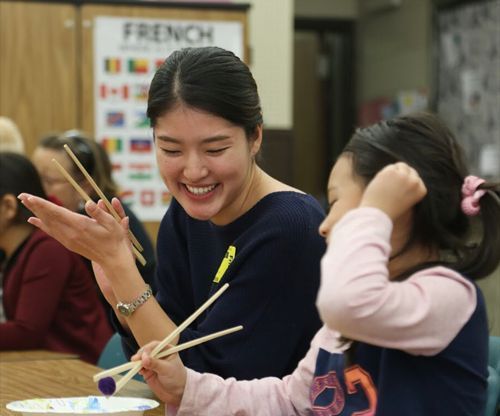Spreading sanshin and Ryukyu language in the US

JOI coordinator Minae Uehara teaching Japanese culture in Virginia.
February 2, 2020 Ryukyu Shimpo
By Tamiko Suzuki
Virginia, U.S.A.—Minae Uehara, Japan Outreach Initiative (JOI) coordinator of the Japan Foundation Center for Global Partnership, is working hard to get students and kids interested in Japan.
Uehara, a native of Oroku, Naha City, was assigned to the University of Mary Washington, where she teaches classes on Japanese culture.
Her classes are organized in to six themes, including Traditional Japanese Music in which she plays the sanshin (Okinawan banjo) she brought from Okinawa, to showcase traditional Okinawan performance arts.
In her Minorities in Japan lecture, she spoke about Okinawa and the indigenous Ryukyuan language, as well as the Ainu people in Japan.
In addition to teaching university students, Uehara visits local elementary, middle and high schools to talk about Japanese culture.
Using her mastery in Japanese calligraphy, Uehara designed activities for kids to learn about the art, in which they write on uchiwa (paper paddle fans) with a brush and ink.
Uehara said about cross-cultural understanding, “In the U.S., people of various ethnicities work together.
Even at my current workplace, most people come from different cultural backgrounds.
Rather than assimilating to one culture, they place value on individuality, so cross-cultural understanding, or in essence respecting each other’s culture, comes naturally.”
Uehara shared a lesson she learned: “The important thing is to be direct and voice your opinions.
In Japan, we often imply and infer, but that communication style breaks down [in the U.S.]” She explained, “Americans are good at expressing their opinions while being considerate to each other.
I learned that there are words that act as cushions [to buffer a blow.] I was thrown at first but now in my second year, I’ve adjusted to the environment and I live a happy life.”
Uehara is full of determination. “I want to find a career where I can offer a nudge to the future generation of young Okinawans who are outward-looking and might be interested in studying abroad.”
The Center for Global Partnership, founded by the Japan Foundation, has delegated JOI coordinators since 2002 as part of its program, which aims to promote mutual understanding between the U.S. and Japan.
JOI coordinators act as bridges between the two countries, and the Center has delegated about 70 coordinators thus far to colleges and Japan-America Societies across America.
Coordinators are required to have an excellent command of the English language and are selected after completing a written test and interviews in both Japanese and English.
(English translation by T&CT and Monica Shingaki)
Previous Article:The campaign to become the best in Japanese pro baseball begins for eight teams in Okinawa
Next Article:Cruise ship filled with cargo instead of passengers arrives at Naha Port as ship stops taking passengers due to corona virus
[Similar Articles]
- South American students visit Okinawa for cultural exchange with the elderly
- Uchinaguchi class of the Okinawa Association of America marks its 9th anniversary
- Ryukyuan Heritage Language Society suggests Okinawa include Ryukyuan languages class in education at schools
- Okinawa International School starts offering Shimakutuba classes
- Okinawan municipalities conduct Japanese language assistance for students with foreign citizenship
 Webcam(Kokusai Street)
Webcam(Kokusai Street)


